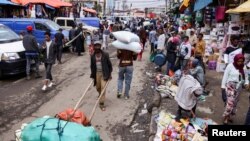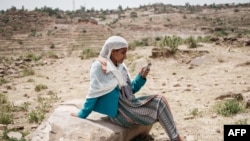On November 15, Ethiopia’s leader, Prime Minister Abiy Ahmed Ali, addressed parliamentarians about the recent agreement to end the civil war in Tigray and the state of the country’s economy, which has been restrained by that war.
Just three years ago, the Brookings Institution think tank in Washington, D.C., had declared Ethiopia one of Africa’s best economic performers. This was not long after Abiy came to power promising economic and other reforms expected to accelerate what already had been more than a decade of growth.
After his November 15 speech, Abiy tweeted some further boasts about the economy, including:
“Ethiopia's economy held up under pressure & reached $127.6 B, demonstrating that our economy is unbreakable & will continue to grow. The per capita income reached $1,212.
Pointedly, he also took issue with a World Bank report on Ethiopia’s economy, saying it wasn’t positive enough:
“According to the World Bank, the economy has risen to 1st in East Africa & 3rd in Sub-Saharan Africa … However, we do not agree with the report in its entirety.
“Because Ethiopia has both formal and informal economic activity, we believe it has achieved greater growth than the report indicates.”
Abiy may well have something to cheer about, economy-wise, but his per capita income figure is 26 percent higher than the $960 claimed by the World Bank. Then there’s the matter of inflation, a chronic problem in Ethiopia that has dramatically eroded income growth under Abiy’s tenure.
In all, Abiy’s rosy outlook comes off as uncertain. Moreover, big questions loom about the recent truce, disarmament and the long-term political solution with the Tigray People's Liberation Front (TPLF) militant group.
There’s little doubt that the conflict over Tigray has put a huge yoke around Abiy’s economy. In September, The Associated Press reported:
“[T]he Ethiopian Economic Association’s meeting this month made clear the country is hurting, while international mediators urgently seek progress on talks to end the fighting.
“Because of internal conflicts, the destruction of infrastructure and uncontrolled spending are hurting the economy while ordinary Ethiopians face weakening incomes and rising poverty, economist Alemayehu Seyoum told the meeting…
“The finance ministry now pleads with the public and Ethiopia’s large diaspora to contribute to a ‘national cause’ for war reconstruction and aid. Ethiopia’s National Bank introduced changes to give the government all possible access to foreign currency, including requiring foreign residents to convert all in their possession upon entry.”
Thanks to the cease-fire, humanitarian aid began flowing again into conflict zone on the same day Abiy addressed parliamentarians. The truce ended two years of fighting in which researchers say 400,000 to 600,000 civilians might have died, most from hunger or lack of medical care.
Ethiopia's inflation rate hit 27% in 2021, according to World Bank data. Since 2018, when Abiy came to power, inflation has averaged 20 percent a year. The IMF puts average inflation for 2022 at 33.6 percent in Ethiopia.
In its East Africa economic outlook this month, the Africa Development Bank said Ethiopia’s inflation will be highest among 13 countries in the region with the exception of Sudan. Overall prices are forecast to rise by a third in 2022 and another 27 percent next year.
This past summer, Ethiopia faced record food prices that surged 40 percent higher in February, the United States Department of Agriculture’s Foreign Agricultural Service said.
The African Development Bank projects Ethiopia’s economy will grow by 4.8% next year. Still, that’s slower than Rwanda, Uganda, Kenya, Seychelles, Djibouti and Tanzania. This leaves a far more middling picture than Abiy's.
On November 15, he projected 7.5% GDP growth by the end of Ethiopia’s budget year next July, although that was down from a prior estimate of 9.2%. GDP stands for Gross Domestic Product, a country's total economic output.
All East African countries face some broad economic headwinds, the World Bank’s outlook noted:
“The Russia-Ukraine war has increased global food and energy prices and heightened inflationary pressures in East Africa. Its continuation could weigh heavily on the region’s commodity importing countries and exacerbate food insecurity. Similarly, several East African (EA) countries, including Ethiopia, Kenya, and Uganda, could face rising risks of debt distress …”
This month’s cease-fire is not the first agreement to stop fighting. Back in March, the TPLF and Abiy’s government reached a humanitarian deal that only held for a few months.
Writing about the first agreement in March, Susan Stigant, Africa Programs Director at the U.S. Institute of Peace, outlined the tangled history of the Tigray conflict and why the economy was then one of the biggest potential obstacles to reaching a permanent political solution.
“This war has braked what was one of Africa’s fastest growing economies. This country of 117 million, Africa’s second most populous … is struggling to meet basic needs. Even some middle-class families now can’t afford three meals a day.
“People can’t eat a truce declaration, so a significant, timely injection of funds will be necessary.”
Eight months later, many of those challenges remain.
Abiy’s tweet contends that Ethiopia’s economy is stronger than official estimates because of “informal” economic activity. In fact, the concept of an informal economy is well-known, but it's not clear that this helps Abiy’s case.
The International Monetary Fund describes the informal economy this way:
“The informal economy consists of activities that have market value but are not formally registered.
“The informal economy embraces professions as diverse as minibus drivers in Africa, the market stands in Latin America, and the hawkers found at traffic lights all over the world. In advanced economies, examples can range from gig and construction workers, through domestic workers, to registered firms that engage in informal activities.
“The International Labor Organization estimates that about 2 billion workers, or over 60 percent of the world’s adult labor force, operate in the informal sector – at least part time.”
According to the World Bank, a large informal economy doesn’t correlate with economic strength. Just the opposite:
“High levels of informality generally means weaker development outcomes. Countries with larger informal sectors have lower per-capita incomes, greater poverty, greater income inequality, less developed financial markets, and weaker investment and are farther away from achieving the goals of sustainable development.”
In a comprehensive report published last year, “The Long Shadow of Informality,” the World Bank said the “sector constitutes more than 70 percent of total employment in [developing] countries and roughly one-third of output.”
Government revenues tend to be lower in countries with above-average levels of informality in the economy, the report said.
In Ethiopia, the report said, informal economic activity accounted for a smaller share of the economy – less than 30 percent – than some other Sub-Saharan countries, including Nigeria, Tanzania, Angola, Uganda and Rwanda.


